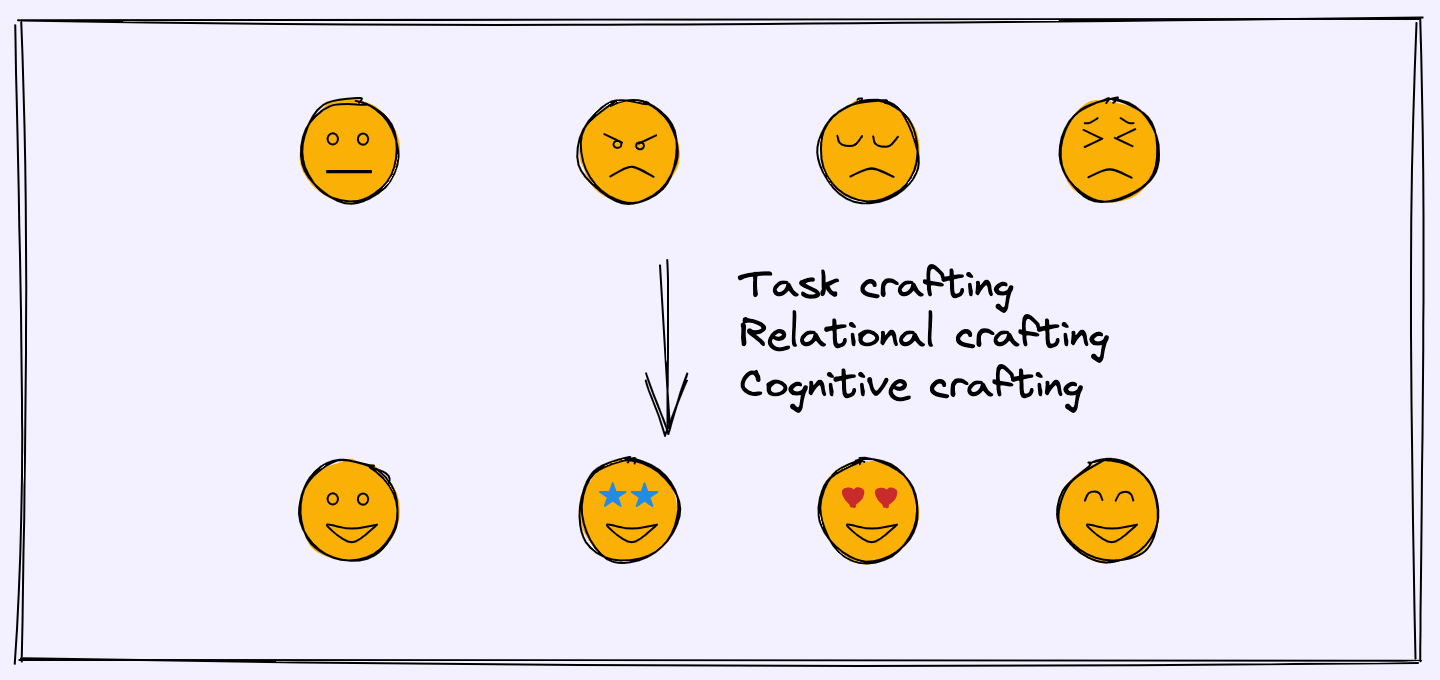Job Crafting: What I've learned about this as an IC in an engineering role

Over the last year, I’ve had a few conversations with friends and colleagues in the industry with one overarching common theme- finding joy at work/ enjoying the work you do/ not interested enough in the work currently in, etc..
Sometimes, we find ourselves in a job role that comes with a host of responsibilities some of which aren’t so enjoyable. I’ve meandered that lane too.
This one particular concept that has been most impactful for me has been ‘job crafting’- redesigning your job in ways that improve your engagement at work, job satisfaction, resilience, and helps you thrive.
It’s an interesting and generic concept by Dr. Amy Wrzesniewski and her team that applies to any job and got me thinking about how it can be used in the tech industry, particularly as an individual contributor (IC) in the software engineering industry.
I also came across this piece of research Dr. Angela Duckworth quoted in her book ‘Grit’ that lays out three concepts:
-
Job
-
Career
-
Calling
Job crafting can help us shift our perspective from job to career to calling.
There are three aspects of crafting:
-
Task crafting- altering the type, scope, sequence, and the number of tasks that make up your job.
-
Relational crafting- altering whom you interact with within your work.
-
Cognitive crafting- modify the way you interpret the tasks and/or work you’re doing.
I’d say software engineering yields itself better to this idea of job crafting given its dynamic nature, multitude of opportunities present and also the broader scope of work we do.
How does one do it? For starters, these are the steps:
-
writing down what you work on (the tasks), who you work with (relations) and how your work feels to you (perception).
-
note down what you would like to change about each of it.
-
the steps for that change
To be effective at job crafting, I feel one needs to be open about it and build trust with their manager and peers while also creating value for the organization. The ease of doing this depends on the size of the team and/or the company. By intentionally crafting our jobs, we can find a sense of identity and purpose to turn a seemingly dead-end job into a launchpad. It all has to start with taking a step back from the daily grind and realizing that you actually have the ability to reconfigure the elements of your work.
A good formula to focus on:
Effective job crafting = Create value for others + Build trust + Support network + Be Open about the process
The Limits of Job Crafting
Not everything is straightforward though and not every theory translates as practically.
Job crafting isn’t a silver bullet because sometimes, you risk taking on too much or altering tasks without understanding your team’s or organization’s goals.
Being candidly open about this process with your manager can open up the possibilities of them helping you identify ways to redistribute tasks in complementary ways. Afterall, one person’s dreaded assignment may be another’s favorite.
I’ll point to a few articles/ snippets below to illustrate my point:
An interesting one that kind of stirred the pot here was Charity Majors ‘Do your one job’ where she notes:
When you are meeting expectations for your One Job — and you don’t necessarily have to be dazzling, just competent and predictable — then picking up other work is a sign of initiative and investment. But when you aren’t, you get no credit.
When thinking about job crafting, it’s common to meander in the career and get caught up in snacking, preening, or chasing ghosts as Will Larson notes in one of my favorite articles ‘Working on what matters’:
If you spend your career snacking, preening, or chasing ghosts, it’s possible but relatively unlikely that what you’ve done before will be valued at companies you interview with. Instead, the only viable long-term bet on your career is to do work that matters, work that develops you, and steer towards companies that value genuine expertise.
Know the priorities
Siddartha Sarda has simplified it a bit further in the article: ‘Something important for someone important’ where an interesting approach is aligning on:
1. One set of objectives that are important to the organization 2. Another set of objectives that are important to your manager 3. The final set of objectives that are important to you
Glue Work
Sometimes, tasks that feel very vital and meaningful to you might be perceived as Glue work in your organization. Tanya Reilly offers solid advice here:
Even for people who are getting recognized for glue work and who want to keep doing it, I really recommend you keep increasing your other skills.
If you only do glue, you will only get better at glue.
Final thoughts
This is a dynamic and ever evolving process. So I like to frequently ask myself (usually during my weekly review sessions)- Are you shaping your job or letting the job shape you?
However, it is also important to acknowledge the limitations and considerations of this concept to best utilize it.
I hope you find this useful as I have. Cheers!